How To "Sell The News" On AMZN For A Fast 73% Gain
I bet you've heard the phrase "Buy the rumor, sell the news" a million times by now, right?
Well, there's a really good reason for that: It's a genuine, tradeable market pattern that can – and does – make people money every day the markets are open.
If you've seen good stocks sell-off after good earnings reports, that's selling the news. If you see a tech stock sell-off after hurdling a lawsuit or marketing some new breakthrough, that's selling the news.
News-selling is easy to recognize once you know what you're looking for, and it hands us traders a whole range of opportunities to make money – and you don't necessarily need to short the stock, either. At the very least, selling the news can be a buy-the-dip opportunity that'll make you money down the road.

Image Source: Pixabay
But I know a "low-risk, high-probability" move to make on this kind of activity that'll put $70 in your pocket right away, and, even better, set you up for a nearly 74% win in just 10 days or so.
Here it is…
Money Is Moving Out of the FAANGS
The S&P 500 closed out the first trading week of December in style, at a new high just below 3,700, which really confirms the holiday trading pattern I've been telling you about lately.
But, like I said last week, not every stock is joining in the fun. Most of the FAANGs have traded sideways or even declined since we got word that a crop of effective COVID-19 vaccines were on the way.
Oh, and just to be clear, I'm talking about the classic FAANGs here: Facebook Inc. (Nasdaq: FB), Amazon.com Inc. (Nasdaq: AMZN), Apple Inc. (Nasdaq: AAPL), Netflix Inc. (Nasdaq: NFLX), and Google/Alphabet Inc. (Nasdaq: GOOGL). We'll go over the broader FANGTANMANs or whatever you want to call 'em another time.
Here's Facebook, which has slid lower to the point where it's consolidating in the $275-$285 range and isn't showing any get-up-and-go:
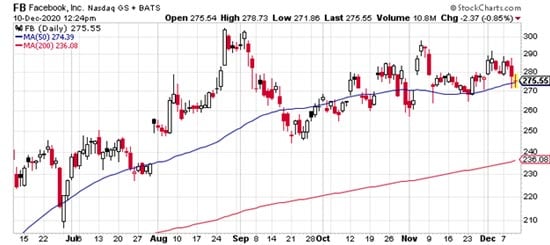
Apple is showing the same thing, but it hasn't been quite as sluggish. It's actually trading above its resistance level, but what should've been a Kool-Aid-Man-style breakout has really kind of fizzled, and it might as well be a million miles away from its 2020 intraday high of around $134.
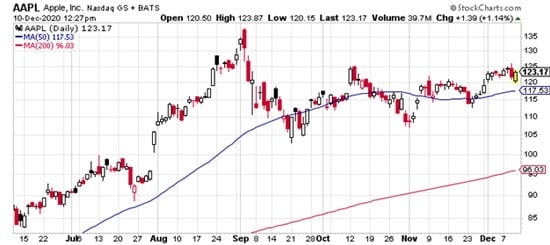
Amazon looks weak, too. You remember those highs at around $3,500 a share? Ancient history. The trading range, you can see here, has really tightened up since mid-November, and we're seeing lower highs and lower lows. It's actually trading below its 200-day moving average (MA200) at the moment. AMZN might actually be the weakest of the FAANG stocks right now.
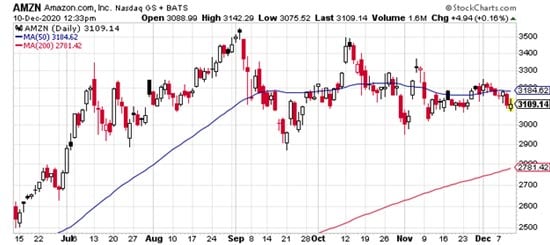
Netflix hasn't been at highs since October, and this is one stock that might actually take a hit from a coronavirus vaccine. There's been a massive increase in the amount of streaming content that people are watching when they just stay home, and that may "wobble" a bit as more and more folks get vaccinated. It's trading in a kind of declining wedge pattern that usually means the bears are sniffing around.
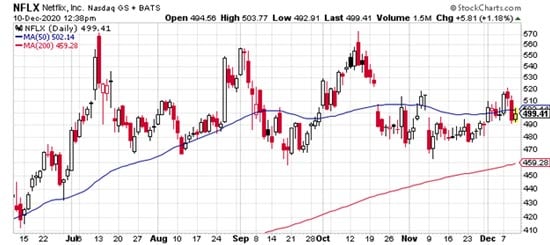
And that brings us to Google's parent company, Alphabet Inc., which is actually the FAANGs' strongest performer right now, even if it's a little late to the Biden Bump/Vaccine Jump party. It's been creating steadily higher support levels, and has made the most recent highs of the bunch.
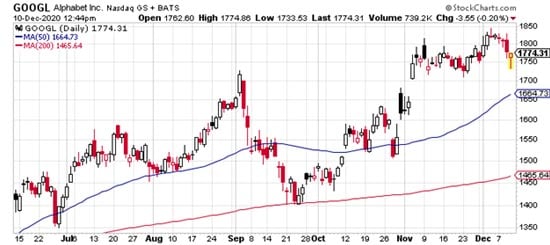
So the weakest stock here, in my opinion, and the best trade, has got to be Amazon.com.
The easiest move to make here would be to sell the stock short; that's aggressive, for sure, but if you do that, you've got a lot of open-ended risk – totally unlimited, in fact. And when you're dealing with a stock like AMZN that's very likely to come back up before long, short-selling is like playing with fire.
There's a high-probability, low-risk move to make here with a trade called a credit spread.
A credit spread is "born" when you sell a higher-strike call or put and protect it by purchasing a lower-strike option of the same type. Note the difference between strike and premium; the strike is the price where the option can be exercised, and the premium is the actual price you pay (or collect) from the option itself.
A bull credit spread is selling a higher-strike put and buying a lower-strike put with the same expiration date. A bear credit spread is selling a lower-strike call and buying a higher-strike call with the same expiration date.
In each case, you should pocket some premium – a credit. When you place the options out of the money (OTM), you increase the statistical probability of winning.
With Amazon, we're taking a bearish view, in the short term, at least. Take a look at the chart again:
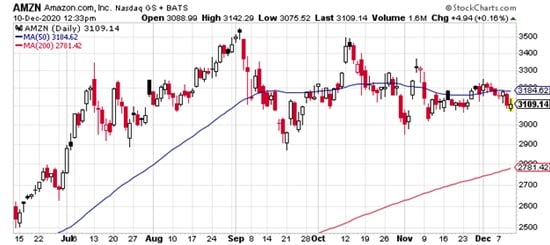
Now, to go out-of-the-money on this, you could place the spread waaaaay up in the $3,450 to $3,550 range… but the distance between what you're paying and taking in won't be very much at all; your probabilities would be good, but your risk/reward ratio would be out of whack, not favorable at all.
I like to sell credit spreads further into the money with the expectation that the stock will move my way.
In this case, you might want to sell a call right about where the market is now, which would be an AMZN Dec. 18 2020 $3105 call and pocket around $580 in premium. You could buy some protection a little further out of the money, like the AMZN Dec. 18 2020 $3120 call, and pay around $510, so your net credit is around $70.
If AMZN moves lower, you can profit to the tune of 70%, but, just as importantly, your risk is capped nice and tight. To unwind it, simply buy what you sold and sell what you bought.
This trade could work in less than 10 days, but the truth is, profit potential can come even faster – sometimes in 100 hours or less. Or, put another way, it's possible to open a small account and "10x" money in under four months.
Disclaimer: Any performance results described herein are not based on actual trading of securities but are instead based on a hypothetical trading account which entered and exited the suggested ...
more


